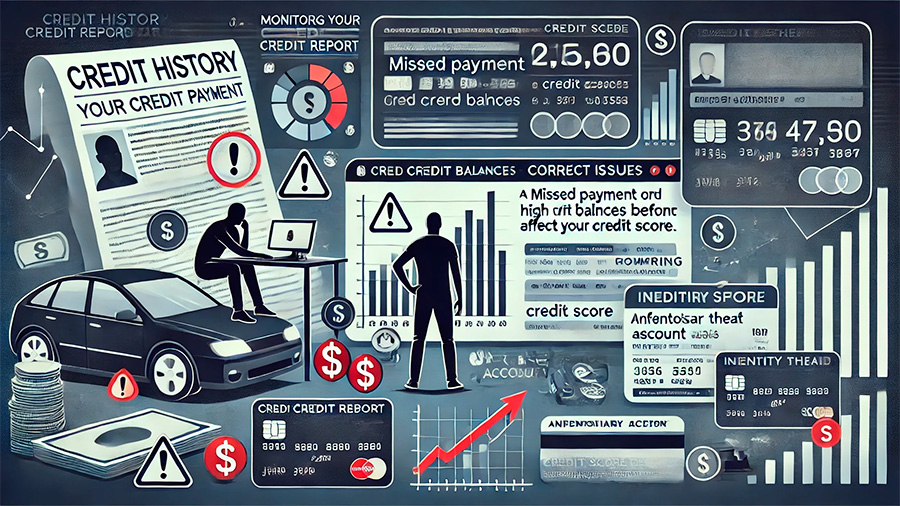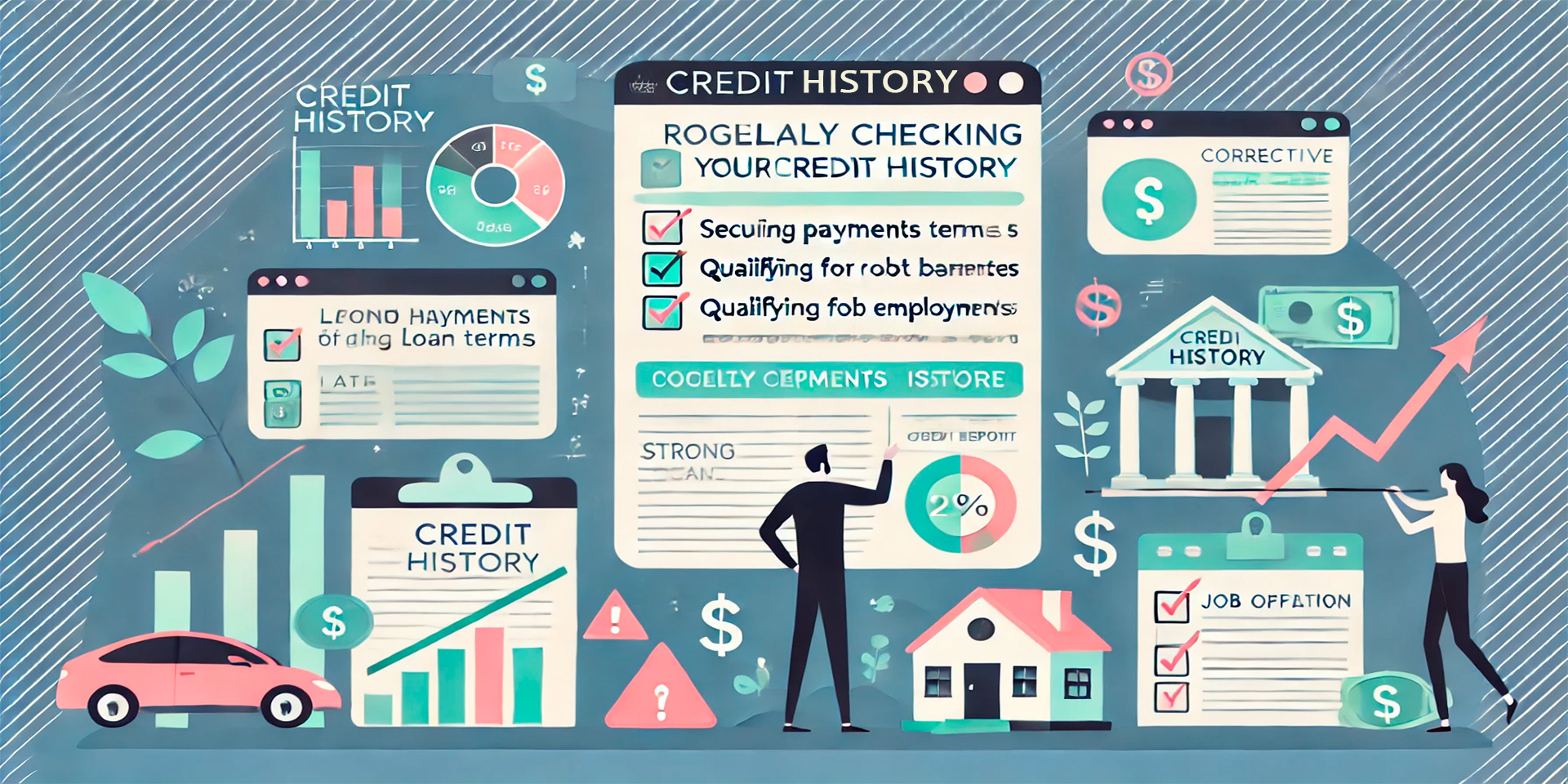Regularly checking your credit history is a proactive step toward maintaining financial stability. Your credit history reflects your financial behavior over time, including how well you’ve managed debt, your payment habits, and any credit issues that may arise. By monitoring this history, you can catch potential problems before they escalate into serious financial troubles, allowing you to stay in control of your finances.
Your credit history is used by lenders, landlords, and even employers to assess your reliability and trustworthiness. If your credit history contains negative marks—such as late payments, high debt balances, or inaccuracies—these can affect your ability to secure favorable loan terms, qualify for housing, or even land a job. By keeping a close eye on your credit history, you can take corrective actions early and avoid these financial pitfalls.
The Importance of Regular Credit Checks
Checking your credit history regularly provides you with a clear picture of your financial standing. Credit reports, provided by the major credit bureaus—Equifax, Experian, and TransUnion—detail your credit activity, including your loan balances, credit card usage, and payment history. By reviewing these reports frequently, you can ensure that all the information is accurate and up to date.
Errors on credit reports are more common than many people realize, and these mistakes can have serious consequences. For example, an incorrect listing of a missed payment or a balance you’ve already paid off could lower your credit score, making it harder to qualify for loans or secure favorable interest rates. By checking your credit report, you can quickly spot and dispute these inaccuracies, ensuring that your credit history reflects your true financial behavior.
Regular credit checks also allow you to monitor your credit utilization—the percentage of available credit you’re using. High credit utilization can lower your credit score, even if you make timely payments. Keeping your credit utilization low is key to maintaining a healthy credit profile, and regular credit checks help you stay on top of this important metric.

How Credit Monitoring Prevents Financial Problems
Monitoring your credit history is one of the best ways to prevent financial problems before they arise. By staying informed about your credit status, you can identify potential issues early and take action to avoid more serious financial consequences.
For example, if you notice a missed payment listed on your credit report, you can quickly investigate and correct the issue before it has a lasting impact on your credit score. Similarly, if you see that your credit card balances are creeping up, you can take steps to pay down your debt and avoid the negative effects of high credit utilization.
Credit monitoring can also help you identify signs of identity theft or fraud. If an unfamiliar account or unauthorized charge appears on your credit report, this could be an indication that your personal information has been compromised. Catching fraudulent activity early allows you to take steps to protect your credit and limit the damage.
The Long-Term Benefits of Checking Your Credit History
One of the most significant long-term benefits of regularly checking your credit history is the ability to maintain a strong credit score over time. A high credit score opens doors to better financial opportunities, such as lower interest rates on loans, higher credit limits, and more favorable terms on credit cards. By keeping a close watch on your credit history, you can ensure that your score remains strong, positioning you for better financial outcomes in the future.
In addition, regularly monitoring your credit helps you build better financial habits. It encourages you to stay on top of your debts, make timely payments, and avoid unnecessary borrowing. These habits not only improve your credit score but also contribute to overall financial well-being, helping you avoid financial pitfalls such as debt accumulation, missed payments, and default.

Using Credit Reports to Plan for the Future
Checking your credit history doesn’t just help you avoid financial pitfalls—it also allows you to plan for future financial decisions. Whether you’re considering buying a home, financing a car, or applying for a personal loan, understanding where your credit stands gives you a clearer picture of what to expect in terms of loan approvals and interest rates.
By reviewing your credit report ahead of major financial decisions, you can take steps to improve your credit score if necessary. For example, if you notice that your credit utilization is high, you can focus on paying down balances before applying for a loan. If your report shows any late payments, you can ensure that all future payments are made on time to boost your credit profile.
Proactively monitoring your credit history allows you to make better financial decisions and secure more favorable terms when borrowing money, ultimately saving you money in the long run.
How to Monitor Your Credit History Effectively
To get the most out of credit monitoring, it’s important to check your credit history regularly. The three major credit bureaus—Equifax, Experian, and TransUnion—offer free annual credit reports, which you can access through AnnualCreditReport.com. Reviewing your reports from all three bureaus ensures that you’re getting a comprehensive view of your credit status, as each bureau may report slightly different information.
When reviewing your credit report, pay attention to key details such as your payment history, credit utilization, and the status of any outstanding loans. If you notice any errors or discrepancies, file a dispute with the credit bureau to have them corrected. Correcting errors quickly can prevent them from negatively affecting your credit score.
In addition to reviewing your full credit report annually, consider signing up for credit monitoring services, which provide real-time alerts about changes to your credit report. These services can notify you of any new accounts, credit inquiries, or significant changes to your credit score, helping you stay on top of your financial health and avoid potential pitfalls.
Conclusion
Regularly checking your credit history is a smart and proactive way to avoid financial pitfalls. By monitoring your credit, you can catch errors, prevent fraud, and ensure that your credit profile accurately reflects your financial behavior. This vigilance not only helps you maintain a strong credit score but also sets you up for long-term financial success by making informed borrowing and financial decisions. With regular credit checks, you can stay ahead of potential issues and protect your financial future.









